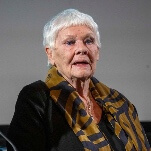Toronto Film Festival '09: Day 3

The Road
Director/Country/Time: John Hillcoat/ USA/ 119 min.
Cast: Viggo Mortensen, Kodi Smit-McPhee, Charlize Theron
Program: Gala
Headline: Apocalypse soon
Scott’s Take: The good news first: Despite getting pushed back a full year for retooling, Hillcoat’s adaptation of Cormac McCarthy’s post-apocalyptic odyssey isn’t a disaster by an measure; indeed, several of my critic friends were moved to tears by it. The bad news: Alas, I’m not one of them. Translating McCarthy’s unrelentingly bleak vision into a palatable feature film couldn’t have been easy—and was probably not a good idea from the start—but Hillcoat and cinematographer Javier Aguirresrobe supply some haunting images of an American landscape shrouded in ash and littered with the artifacts of an unthinkable human tragedy. And Viggo Mortensen and newcomer Kodi Smit-McPhee also acquit themselves as a father and son who trudge across a barren country where nothing grows and the scant survivors are often reduced to desperate marauders and cannibals. Yet the really bleak part is the realization that father and son are not surviving so much as staving off death; human life will eventually be extinguished no matter what they do, so “the road” of the title basically leads to nowhere. Someone like Michael Haneke would have no trouble embracing this material’s uncompromising dreariness—in fact, Haneke already did his own post-apocalypse film in Time Of The Wolf—but Hillcoat’s version is a little soft and, in the closing minutes, regrettably sentimental. The constant threat of death, whether through an extended period of starvation or an attack from zombified savages, should sustain a low-level tension throughout, but The Road is mysteriously flat, hobbling from scene to scene without giving them much individual life. Points off also for the surprisingly cloying Nick Cave and Warren Ellis score, which damages a film that needs to earn its hard-won emotions.
Grade: C+
The Ape
Director/Country/Time: Jesper Ganslandt/Sweden/81 min.
Cast: Olle Sarri, Francoise Joyce, Niclas Gillis
Program: Vanguard
Headline: Man wakes up the morning after a tragic event and tries to figure out what to do with his day
Noel’s Take: Dardennes-style follow-shots abound in this short, punchy drama about the evolving day of a man still reeling from something awful that happened the night before. Revealing that something awful in this review would sort of spoil the movie—which is precisely what's wrong with The Ape. Writer-director Jesper Ganslandt leans too heavy in his central mystery, hoping we won't notice that without it, The Ape is more or less just another European "guy walks around" movie, low on dialogue and incident. Reportedly Ganslandt didn't give his star Olle Sarri his script pages until shortly before shooting each scene, and while that's a neat idea for an acting exercise, Sarri's cluelessness doesn't really add anything to the film. Like the audience, Sarri doesn't know whether a scene is meant to be laced with irony, or pathos, or suspense. It all just sort of is. Yet despite Ganslandt’s misguided M.O., The Ape is still fairly haunting, if only because after spending so much time trying to piece together the clues of what's happening, we're left with lots of disturbing questions when the movie ends abruptly. That’s the effect I'm sure Ganslandt was trying to achieve. But he takes a rough road to get there.
Grade: C+
Cleanflix
Director/Country/Time: Andrew James & Joshua Ligari/USA/85 min.
Program: Real To Reel
Headline: Mormon video stores fight for the right to not party
Noel’s Take: No doubt many of you recall the hubbub that ensued several years back when a group of Mormon businessmen and video retailers began selling "sanitized" versions of big Hollywood movies like Titanic. The Directors Guild Of America first protested then sued, arguing that no one’s allowed to bowdlerize their work without permission. The Cleanflixers argued back that what they're selling is essentially what the studios themselves offer to airlines and television; and anyway, they're altering copies of movies that were legally purchased, so the studios and creators are duly compensated. Doesn't a consumer have a right to do whatever he or she wants with his or her property? The documentary Cleanflix deals with these thorny ethical and aesthetic questions, and adds another wrinkle to the story when it follows Daniel Thompson, a video store owner rumored to be involved with illegal duplication, fraud and sexual indiscretion. Cleanflix can be a little one-note as it rehashes its central issues over and over; and the film's style falls too much into the breezy, bouncy modern doc mold. But Daniel's story deepens what Cleanflix is about. The real story isn't just about intellectual property; it's about the daily difficulties that the devoutly religious have in trying to participate in mainstream American culture while retaining as much of the purity of their own beliefs as they can. To some extent, the filmmakers fighting the clean-up business are contending that their work grapples with the ugly, messy, sexy world that some Mormons would rather not confront, and that the PG versions actually do their viewers a disservice. Certainly what ultimately happens to Daniel (in turns of events loaded with irony upon irony) proves that avoiding R-rated movies may not mean that you avoid an R-rated life.
Grade: B
Face
Director/Country/Time: Tsai Ming-liang/ France-Taiwan/ 141 min.
Cast: Lee Kang-sheng, Laetitia Casta, Fanny Ardant
Program: Visions
Headline: A master of deadpan alienation produces his opus
Scott’s Take: The latest from Tsai Ming-liang, the fine Taiwanese director responsible for such exquisitely melancholic (and often hilariously deadpan) films as The River and What Time Is It There?, plays like a greatest hits of auteur tropes, but this one’s for fans only. The Cannes crowd reportedly hated it, and I can see why to a degree: Here’s a film so determinedly confounding that we don’t find out that what the movie-within-a-movie is dramatizing until 110 minutes into it. Instead, there’s an assemblage of conceits that have found their way into Tsai films past: An obsession with water (which leads to what might be the funniest setpiece he’s ever done), sexual aberration and grief within a family, the strange and referential use of iconic movie stars (in this case, Fanny Ardant and Jean-Pierre Léaud, though others turn in cameos), colorful musical sequences that pop up out of nowhere, et al. Though elusive as a whole, Face is always gorgeous to watch and intermittently astounding in bits and pieces. The aforementioned water setpiece, involving a busted sink, reasserts Tsai’s (and muse Lee Kang-sheng’s) allegiance to Buster Keaton, and the musical interludes are all strikingly conceived, especially a lovely number in a river tunnel and another that’s all dance, no music. And if you’ve ever wanted to watch Fanny Ardant haul a stag head down a spiral staircase, this is your chance.
Grade: B
George A. Romero's Survival Of The Dead
Director/Country/Time: George Romero/USA/90 min.
Cast: Alan Van Sprang, Kenneth Welsh, Devon Bostick
Program: Midnight Madness
Headline: How will the dead survive?
Noel’s Take: I'm a pretty big fan of George Romero's zombie movies, to the extent that I'd put the original Dawn Of The Dead in my personal Top Ten Favorite Movies Of All Time, but even I was underwhelmed by Romero’s recent "reboot" zombie effort Diary Of The Dead, which struck me as largely witless and strained. The sequel Survival Of The Dead follows one of Diary’s minor characters—a rogue soldier, leading a band of scavengers—as he heads toward an island rumored to be safe haven. There he and his crew discover two long-feuding families who have conflicting ideas of how to handle the coming plague. One group wants to kill all zombies on sight; the other says that since these zombies are family, they need to be caged and preserved until a cure for zombie-ism is one day found. Unlike Diary, Survival is an honest-to-goodness movie, shot with decent locations and actors and effects, and with a script that’s classically Romero-ian in its emphasis on how people solve their problems in stages. (Got to head to the thing in order to get the thing that allows you to do the other thing, etc.) But while it’s a more likeable movie overall, Survival lacks the kind of grand theme that gives the best Romero zombie movies their oomph. There’s a little here about family values and religious indoctrination, but not enough to generate any satirical heat. Plus, Romero’s increasingly begun to play to a core base of fans who like to dress up as zombies and cheer on every clever kill in the movie. Survival has lots of those clever kills; it just doesn’t provide much of a reason for them to exist.
Grade: B-
The Imaginarium Of Doctor Parnassus
Director/Country/Time: Terry Gilliam/ Canada-U.K./ 122 min.
Cast: Christopher Plummer, Heath Ledger, Tom Waits
Program: Gala
Headline: Mr. Gilliam’s Wonder Emporium
Scott’s Take: I’m normally of the opinion that artists should free rein to express themselves; any outside interference from The Man will only cloud the purity of their vision. That’s not the case with Terry Gilliam: Someone very large needs to sit on him, or else he’s going to continue to make unmoored fantastical calamities like Tideland or this dull, confusing repository of visual ideas. The story, such as it goes, follows the ageless Dr. Parnassus (Christopher Plummer) and his three-person performance troupe as they put on a traveling roadshow that’s met with apathy or derision in contemporary London. Meanwhile, Parnassus and a devilish adversary (Tom Wait) are locked in a centuries-long pact that gives him immortality and imaginative powers, but with his daughter as collateral. Heath Ledger appears as a mysterious stranger who joins the gang, and it says something about the film’s loose conception that Johnny Depp, Colin Farrell, and Jude Law were brought in to complete the late actor’s performance, and it’s not in the least bit jarring. The “imaginarium” of the title gives Gilliam carte blanche to fiddle with wild digital effects, but for lack of a better word, the film could stand to be more conventional, if only to provide some much-needed contrast. Doctor Parnassus is all flights of fancy, and the manic tone gets exhausting fast. As for Ledger, Gilliam and company have sweetly refashioned the film as tribute within a fantasy, but The Dark Knight will be the more lasting monument to his talent.
Grade: D+







































